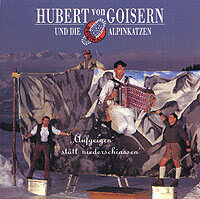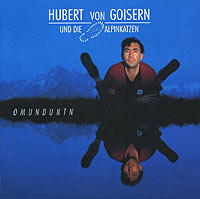ALPINKATZEN
Hubert von Goisern and the Original Alpinkatzen
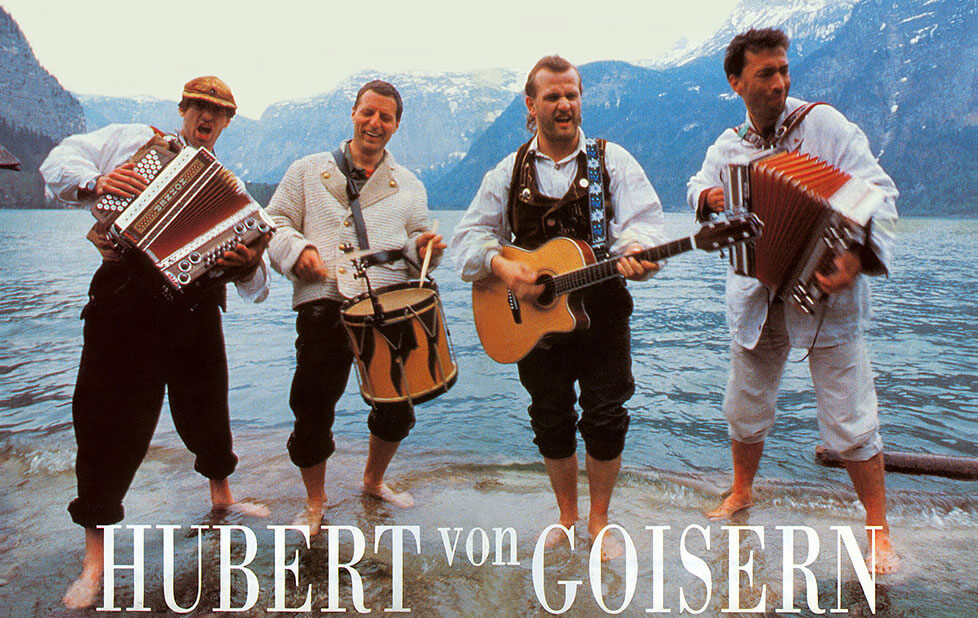
Pop and gstanzl, blues and landler, rock and doubles - that doesn't exist? You must be kidding! Since 1984 Hubert von Goisern und die Original Alpinkatzen having been breaking just about every musical taboo. It's not easy to find a focal point in their creativity. If you must, then it is the area of folk music, which runs as the main thread through the Alpinkatzen story. And it exactly this which is a thorn in the side of the folk music purists. For the Austrian formation mix together whatever there is to be mixed. The Austrian troupe shy away from hard rock yodelling just as little as they shy away from a dancefloor landler.
There is simply no musical path that the four member band would not consider. And so arise astounding symbioses, like something in in the style of an alpine reggae, or a house-rock 'n' roll breather upon in Styrian style, or, or ... It could only come to this unique mixture because with the association of the interpreters, different musical pasts simply crossed over. Founder and head of the alpine tomcats is Hubert von Goisern.
He once played music in a brass band in his homeland. Afterwards, he concerned himself with the sound cultures of exotic countries and dedicated himself to various avant garde projects. His favourite instrument is the "Steirische", a special kind of accordion. Aside from that he handles the fife and the beefhorn. But Hubert is also perfect on the guitar and as singer. Reinhard Stranzinger (guitar), Stefan Engel (keyboards) and drummer Wolfgang Maier are also highly musical. And they can sing too.
At the same time, with the Alpinkatzen things don't depend so much on perfectionist vocal cord violation. The lyrics of their songs are much more important: here one can be totally confounded by the composed mélange offered by the rocky band and then the really biting, ironic and distinct words go one step further.
When the alpine tomcats stand on the stage, then the audience doesn't know whether now, for example, it should swing to the call to a mountain-pasture-rap-metal-yodel, or rather remain sitting to let the lyrics melt in their ears, or both, or what? Well, it's all really quite strange, what the band around frontman Hubert von Goisern has to offer.
The motto is: "spreading odd folk music among the people". That's how it was with the previous vinyl pressings, it's how it is with the newest LP, which is called Aufgeigen stått niederschiassen. One has seldom heard the fusion of folk music roots and rhythm 'n' blues elements in such authenticity. Furthermore the technical quality of the product convinces.
There is something for everybody. For all those who can't shed their Anglo-American listening habits, for all those who can't renounce folk music and for all those who can't lower their high quality standards. Only so much is guaranteed: Alpinkatzen stand for unashamed folk music, based on the motto "Ziehharmonika goes Rock 'n' Roll!"
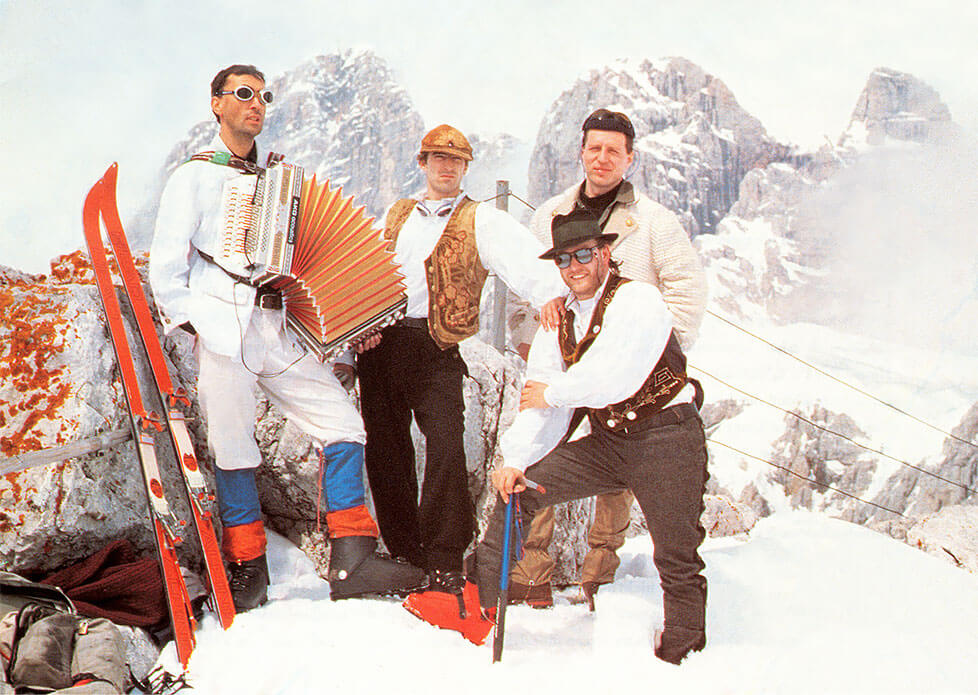
Studio Albums: 1992-94
Aufgeigen stått niederschiassen
- 01. koa hiatamadl
- 02. wildschütz räp
- 03. heast as nit
- 04. benni
- 05. ich brauch keine $
- 06. kurt gib nicht auf
- 07. neu-ausseer
- 08. sepp bleib do
- 09. weit, weit weg
Of calf rock and alpine blues
Interview with the Austrian alpine rocker Hubert von Goisern
Hubert von Goisern, born 1952, is currently the most successful Austrian rock musician. With his CD Aufgeigen stått niederschiassen and the catchy tune of Hiatamadl, he's sold more than 100,000 records. Folk music in linen complexion: an astonishing mixture of alpine reggae, blues, gstanzl, and rap metal yodels. Last week, the alpine rocker appeared in Meran.
Hubert von Goisern, in Meran, in the middle of the Alps, are you a fan of alpenglow, or is that just kitsch?
No, I really like the Alps, and I think that kitsch can only be something man-made.
With your music between blues and rock, country dance and gstanzl, don't you ever have the feeling that you are violating tradition?
The people who charge me with violation and condemn a change in folk music, and be it only with a new instrument, are those who would never forgo their cars and their fridges.
How does your music develop, where do you draw from?
I grew up with folk music, then I came to blues and jazz and funk and avant-garde. Aside from that, I travelled a lot and in doing so simply opened my eyes. All that comes to me when I write my lyrics and melodies.
It is said that you eloped and lived for a long time in the Philippines. Did you return to your own roots and to folk music through that?
That's right, because I experienced there what folk music means. There was neither a radio nor a television there. When a celebration took place, everyone simply sang along and nobody thought, oh dear, the old numbers again, it was just music, no matter if the songs were a hundred years old. It impressed me a great deal, how life, lyrics and melodies were interconnected and I thought to myself, the remainder of that must have been detectable at home too. When I then returned, I began to get into folk music, which I had actually broken with.
Are there models towards whom you orient yourself?
There are many people I highly regard. From Mozart, Verdi, Puccini and Wagner to Miles Davis, Fellini and André Heller.
It's said that there will soon be an alpine opera from you.
At the moment there is the concrete plan to make a film, and we'll see if the same story can be translated to an opera.
It's Marika Rökk's birthday. Do you like the music of the 30s?
Each era has their good, creative people and their cultural dwarves who have nevertheless managed to make it into the spotlight. Generally, I don't like musical and opera especially, but I know that my grandmother really liked Rökk, and since I really liked Grandma, I then really liked her too.
You had your first Styrian accordion from your grandfather. Were your grandparents the very first fans from the beginning?
Yes and, for a long time, the only ones. My grandfather is more than ninety years old now, he gave me his Styrian because he said, I'm too old and can't press the keys any more. For me, this instrument was always connected with dusty melodies and I didn't touch it for five years.
Jörg Haider also comes from Bad Goisern. What do you think of him, and where would you put yourself politically?
I'm ashamed of Haider and I can only hope that God's ways are mysterious and winding and that he also has a function in society.
Do you see folk music as a rebellion against power and control?
It must be. Folk music simply can't be whitewashing of the facts, it has to express what the people feel.
You made the absolute breakthrough with Hiatamadl. Do you have a calf complex, do you especially like girls with fat calves?
I didn't write the refrain, it's an old folk song from a time when the people of the countryside squinted in the direction of the town and imagined that life is more comfortable there. And because the grass is always greener on the other side, the girls were also imagined to be better, more buxom and more beautiful.
What do you think the reason is for your success?
I think it's the contrast of the songs. That people are so exhausted after numbers like Sepp bleib do or the Wildschützrap, that they are really open for something that would ordinarily make their ears close with a snap.
What relationship do you have personally to yodelling?
Certainly an erotic one, and yodelling is a form of singing where you can't hold anything back. You can't yodel with half strength, it only works when you open up just like that and give it, it's like breathing.
When and where did you learn to yodel?
It was about five years ago, I got hold of a cassette, because I was fascinated by this singing technique and everyone maintained that you can't learn to yodel, you're born to it. Then I wrote down the notes and the phonetics of the syllables of a yodel, found my vocal pitch in which I could yodel and practised nonstop.
Are you a religious person, do you believe in God?
For me, God is not a man with a beard and penis, God, for me, is an idea. I left the church because I couldn't abide this masculine image of God.
Hubert von Goisern, a Luis Trenker for the 90s?
The comparison flatters me a great deal. I always liked the Luis trenker films, although he was always suspect to me, he didn't just play someone from the mountains, but he was one too. I'm totally convinced.
What do you think of the Tracht look?
I do like clothes where you can well identify a regional identity, I most like to wear linen clothes, but since this Tracht boom broke out, I hung up my leathers.
Do you go to discotheques and how do you bear computer-controlled rhythms?
There was a time when I went to the disco a lot and danced away to the general booming. I still like to dance, but it must simply be music that's man-made if possible.
Your very personal wish for the future?
That I will never become a copy or caricature of myself and that I remain human and don't dash from stage to stage, from hotel room to hotel room, out of touch with the real world.
Hubert von Goisern: A summit stormer plays powerfully
Alpine rock from Salzkammergut
His record Aufgeigen stått Niederschiassen is well on the way to conquering the summit of the Austrian LP charts. Together with the Original Alpinkatzen he makes "outrageous folk music". Ever more young people choose his songs - like for example Hiatamadl - for their sing-along anthems. His exciting stage show has brought him the name "Mick Jagger of Salzkammergut". His civil name is Hubert Sullivan. The folk rocker will certainly be familiar under his stage name. This name shows that he comes from a country where the music makers play an important role and also testifies to the fact that the bearer is proud of his origins: Hubert von Goisern. It is a long, long time since sounds leaning towards folk music from Salzkammergut have been heard by the Ö3-Hitparade public. Ziwui Ziwui was the title and Wilfried was the artist - also a Goiserer. "The difference between Wilfried and myself is that he did not carry on consistently and perhaps today does not stick to what he did at that time. But he was an important forerunner for the modern processed folk music," says Hubert about his predecessor.
Affair with rough diamonds
The music which is presently giving the Alpinkatzen so much success - the record is at number 10 in the LP charts - is not easily described. It is also difficult for Hubert to find a valid collective term for this affair between deeply rooted folk music and the rough diamond rock, funk, blues and rap. "There is no recipe for my music. It must be singable and go comfortably. But today everything is taboo that is nice. The more suspicious, the better. On the other hand, I believe only the people themselves can really open the beauty. What we play today is in any case the quintessence of that which I have witnessed and learnt in my music career.
The 40 year old thoroughbred musician has probably already witnessed more than most of his peers. He spent the first years of his life in "Bads". Born as Hubert Achleitner in Bad Ischl hospital, he grew up in Bad Goisern and attended the grammar school in Bad Aussee. Anyway, his middle school career was soon to come to an end because school was a "horror" for him. So his parents had to put their wish for their son to become a doctor right out of their minds.
The young Hubert had a lot of success in music. Early on he rose to the first trumpet in the Goiserer citizens' band. A dispute with the band leader over the repertoire - Hubert had expressed the presumptuous wish to not play the antiquated pot pourri In The Mood - he was thrown out. "The band leader was definitely irritated too, he was always being sardonically asked about my long hair, whether he had recently let girls join the band," grins Hubert mischievously.
The exit from the band also meant that Hubert had to give back his trumpet. So he switched to the guitar and soon started a band. Anyway, he also had disagreeable experiences with this instrument: "We rehearsed in the garden because we thought that everyone liked it. Anyway, the visitors got enormously uptight, so the police intervened," he tells.
After a first rather unsuccessful record production, he emigrated finally at the age of 22 to South Africa. "I simply wrote to different embassies, because I really wanted to get away from home. I found work in South Africa as a skilled chemistry laboratory technician. The embassy asked me what I thought of apartheid. And I said honestly: "Apartheid? Never heard of it!" Therefore I was the ideal candidate!" With his girlfriend whom he soon married, two suitcases and 10,000 Schillings of ready money, he took himself to the Cape of Good Hope.
After three and a half years he had had enough of the inhumane politics of the racial segregation. "I was faced with a decision: go with it, or go underground. So we went back to Austria!" Arriving back home, the pair divorced. Hubert met a Canadian girl, married her on the spot and moved to Toronto with her. "For the sake of simplicity, I took her name. That's why, although I am long divorced, I am still called Sullivan today," Hubert reveals the secret of his civil name.
Experiences with headhunters
After two and a half years studying music in Canada, the Goiserer, who now lives in Salzburg, took himself off on a long Asian journey. There he had various crucial experiences which would change his life. "I lived for a few months with head hunters in the Philippines and there learned to play the noseflute, which is included in folk music. The people sang me their folk songs and I sang them ours. So we got along splendidly."
With these impressions in his luggage, he journeyed back to Vienna, there to try and find out how deeply folk music from the Salzkammergut "matched up". His study of experimental music he earned himself with various bands as well as with single appearances in bars and on Kärnter Strasse. There the manager of a record company finally discovered the musician and offered him and his partner Wolfgang Staribacher a contract. That was the birth of the Alpinkatzen.
Hubert's stage name also comes from that time. "We introduced ourselves at performances like this: 'That is Wolfgang from Vienna and I am Hubert from Goisern'", he rejects any suspicion that he could have chosen a title himself. The duo had relatively big success with the LP, tour and TV appearances. Nevertheless they split up a year ago.
"Pulling down the frontiers"
Since then, things are looking up for Hubert von Goisern and his new band. He explains why, "The majority of Austrians have folk music in their blood. Our music gives people the chance to listen to what they really want to hear. Perhaps with this we contributed a little to Austrians finding an identity. Then they can more easily accept foreigners. And because today frontiers are falling everywhere, the time is ripe to break them down in music as well!" Hubert's musical mixture shows two levels: tradition and anarchy. "That is truly a contradiction, but don't all things come from contradiction?"
In spite of everything his parents are not entirely happy with his choice of profession. "They say that if they had known that I would become a musician, they would never have let me learn an instrument," smiles Hubert.
Finally, he takes stock of his career: "Earlier people went pale when I unpacked my accordion. I was probably a bit ahead of time. At that time I swam in a huge stream of new folk music which was becoming more and more popular. Time is slowly making up to me, not yet, but soon, then perhaps I will look for something else!"
Accordion goes rock 'n' roll
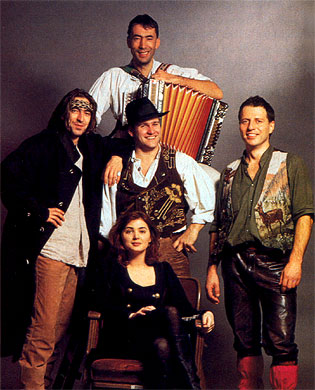 Time and again there are miracles. In the tough music business too. There,
an album is on the market for about a year and then suddenly springs
into the charts, as was the case with Aufgeigen
stått niederschiassen. Hubert von Goisern and his Original
Alpinkatzen from Austria have worked the neighbouring republic
live for months - with success, as is now shown with record sales.
Time and again there are miracles. In the tough music business too. There,
an album is on the market for about a year and then suddenly springs
into the charts, as was the case with Aufgeigen
stått niederschiassen. Hubert von Goisern and his Original
Alpinkatzen from Austria have worked the neighbouring republic
live for months - with success, as is now shown with record sales.
The fusion of traditional folk music with modern (rock 'n' roll) rhythms goes down well. Which is no surprise because in the course of the years Hubert von Goisern has gathered numerous musical experiences, which he now puts into action with his Alpinkatzen: as a child he played in the Goisern brass band, before he hitch-hiked through the world for seven years, looking and listening everywhere, to how other people treated their traditional culture. His knowledge resulting from that: "I want to spread unusual folk music among the people, blend folk music roots with rhythm and blues elements to an authentic mixture - to reconcile regional musical identity with international modern musical forms."
Hubert also still calls the "Styrian" his favourite instrument, a special accordion which substantially shapes the sound of his combo. So, "accordion goes rock 'n' roll", and accordingly, "mountain-rap-metal-yodels" are the order of the day, when the alpine tom cat stands on stage and brings whole concert halls to the boil - last with a joint tour with the Bavarian SPD chairwoman Renate Schmidt, as she tried to approach potential young voters with Austrian help. Whereby the Cats let the politician look rather pale. Not least also because of their ribald, crude, ironic, funny lyrics, for which Goisern sings himself hoarse.
A long breath pays off, these old trade wisdoms and truisms have once more proved to be true through Mr von Goisern: because the Original Alpinkatzen have been breaking all musical taboos since 1984, and after nine years the final breakthrough seems to be successful (also north of the Main).

